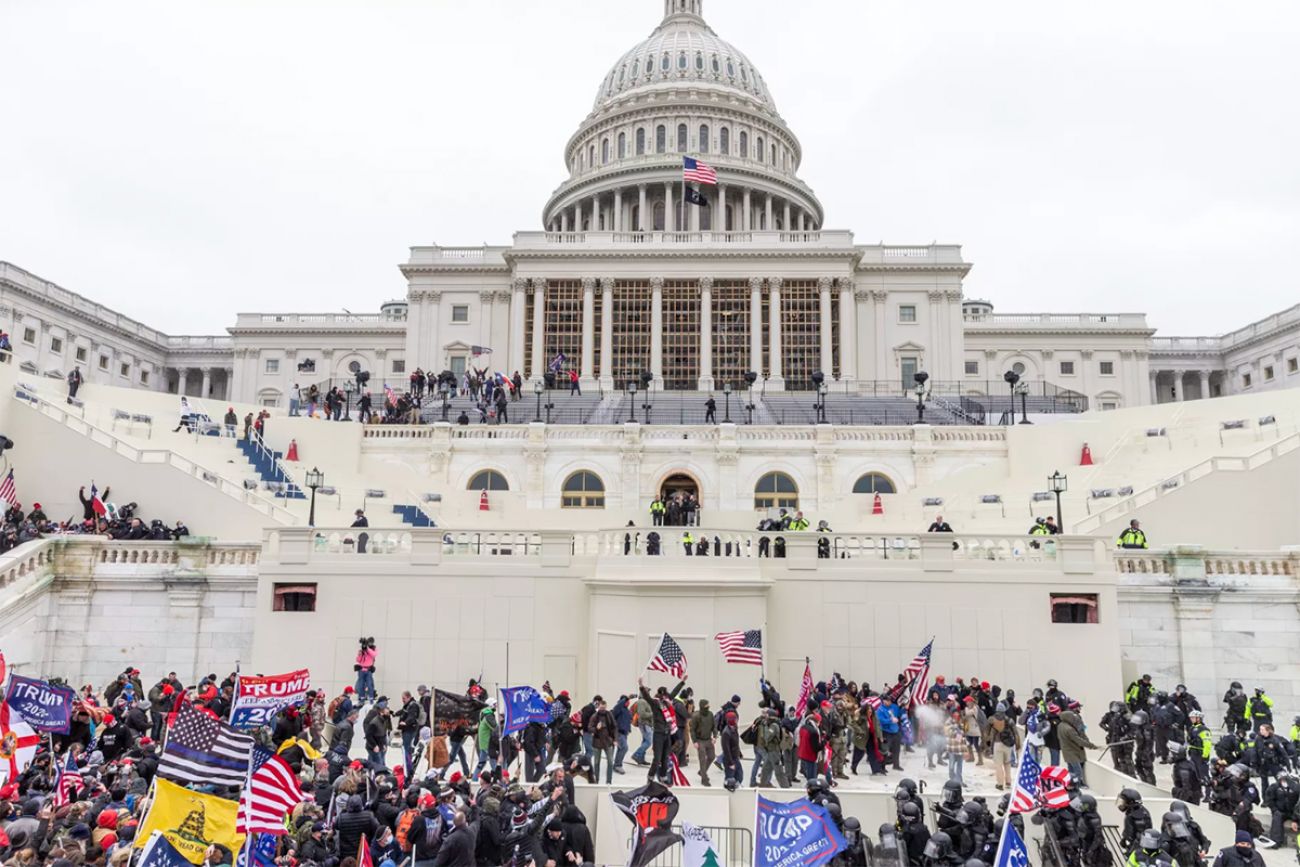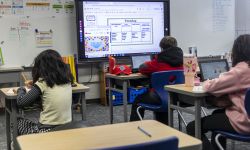Michigan teachers tackle Wednesday’s insurrection: ‘I don’t want my students to be alone’

Owen Bondono’s language arts classes were supposed to focus on text structures Thursday, but there was no way the Oak Park teacher was going to ignore the insurrection that took place in the nation’s capital the day before.
“I think about me at age 13 watching CNN at home on 9/11 and not understanding what I was seeing and feeling like I had to figure it out on my own,” said Bondono, who teaches in the freshman academy at Oak Park High School. “I don’t want my students to feel alone.”
So, Bondono did what felt natural: He let his students talk.
Teachers across Michigan made swift pivots after Wednesday, when a mob of violent extremists invaded and looted the U.S. Capitol at President Trump’s urging as Congress met to certify Electoral College votes.
The discussions, educators say, are important. Students need to have a space where they can share their thoughts and process the events. That may be particularly crucial given the academic and mental challenges students have faced because of the ongoing pandemic.
“Teachers, don’t shy away from talking about today’s events!,” Detroit Superintendent Nikolai Vitti wrote on Twitter Wednesday night. “Our students know what is going on — let them talk. Use historical and current facts. Maintain respect. Allow for passion. I remember some of my best class discussions — and trust breakthroughs — during 9/11” after the terrorist attacks in the U.S.
In some classes, students had a lot to say. Many had serious questions about what the events mean and what the future will look like.
“A lot of my students were struck by the differences in the police response,” Bondono said, referring to the differences between Wednesday’s riot and a Black Lives Matter demonstration months ago that was largely peaceful until protesters were met with heavy police and military presence.
“One of them asked me if Trump considers these people (those who rioted Wednesday) thugs,” he said. Others wanted to know whether Wednesday’s insurrection will be the start of something bigger, and whether law enforcement is doing anything to be better prepared if it happens again.”
Lamont Satchel Jr., a senior at Cass Technical High School in Detroit, raised similar questions. On Twitter Wednesday, he was blunt. “I would be dead. DEAD. If I tried what they are doing in DC, even attempted,” Satchel said. “That reality itself — is disgustingly sad.”
On Thursday, he told Chalkbeat that watching the footage of rioters breaking in a federal building left him and his peers scared for their safety.
“We’re about to be thrown into this violent society, and we can’t do anything,” he said. “How do you balance college and fighting for your life? You’re fighting to not be hung by a tree.”
Bondono, the current Michigan Teacher of the Year, said he’s focused on providing resources to students and letting them draw their own conclusions. He played videotaped statements from Trump and President-elect Joe Biden and asked, “What do you notice?” and “What do you wonder?”
Rodney Fresh, a Advanced Placement world history teacher at Communication & Media Arts High School in the Detroit school district, took a similar approach, sharing statements from Biden and former Presidents Barack Obama and George W. Bush.
The school does wellness checks with students on Wednesdays. But Fresh is hoping to schedule another one Friday or Monday. He knows it’ll take more than a day for that feeling of shock and numbness, from his students and himself, to fade.
“The students need a mental break. We all need a mental health break now,” he said.
In some cases, teachers had a difficult time gauging how students were feeling because in virtual classes, lots of students don’t show their faces on camera.
“In person, I can see expressions, body language that you don’t see online,” said Todd Bloch, a science teacher at Warren Woods Middle School in Macomb County.
Overall, he said, students expressed shock that the rioters were able to breach Capitol security. It’s a tricky conversation, he said, considering that in his classes he has students who “range from someone who would have wanted to be there to somebody who was in Black Lives Matter marches.”
“I tell them that there’s nothing wrong with the people protesting. It’s a part of democracy,” Bloch said. “It’s when the protests turn violent. That’s not a way to solve problems. They seemed to understand the difference.”
In southern Wayne County, Kyle Zawacki began planning Wednesday afternoon in the midst of the insurrection in Washington, chatting with his fellow social studies teachers to determine how to address the day’s events in his social studies classes at Huron High School.
In several of his classes that were slated to spend the time preparing for a Friday quiz, Zawacki began the class asking students if anyone wants to talk about what happened. He told them they could include their comments in the chat function of their virtual classroom, email him personally, stick around after class, or chat during a student support hour.
“I won’t really push it,” he told Chalkbeat Wednesday afternoon. But, “I want them to know that I hope everyone is processing what they saw and I’m here to talk.”
In another class that has been discussing the rise of totalitarianism, he planned a deeper discussion. The focus for Zawacki is to allow students to have a voice.
In one class, students were quiet and didn’t have a lot to say. In the others, he said, the conversation went well.
“I had more than a half dozen students reach out via email to thank me for covering the topic and wishing we could have more relevant content in the future,” Zawacki said.
“It always has to be student led,” he said.
Bondono said the discussions he had with students Thursday are similar to what they’ve had in other big moments. But Thursday was more difficult for him. He said he “felt very adrift with it,” and was struggling to process the events himself.
“There’s a part of me that thought, ‘Am I watching the end of the democracy?’ … Part of it was being overwhelmed with the enormity of what was happening.”
Michigan Education Watch
Michigan Education Watch is made possible by generous financial support from:
Subscribe to Michigan Education Watch
See what new members are saying about why they donated to Bridge Michigan:
- “In order for this information to be accurate and unbiased it must be underwritten by its readers, not by special interests.” - Larry S.
- “Not many other media sources report on the topics Bridge does.” - Susan B.
- “Your journalism is outstanding and rare these days.” - Mark S.
If you want to ensure the future of nonpartisan, nonprofit Michigan journalism, please become a member today. You, too, will be asked why you donated and maybe we'll feature your quote next time!






